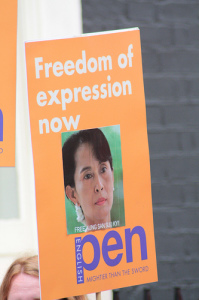Every nano-second, millions of bloggers and twitters around the world communicate with each other and the universe at large with a freedom everyone takes for granted. Well … not everyone.
Could you go to prison for your blog?
It happened to 19-year-old high school student, Tal Al-Mallouhi, a blogger and poet in Syria. Summoned for questioning about her blog entries a year ago, she has been imprisoned ever since. For the first nine months she had no contact with her family or a lawyer.
Raghdah Sa’id Hassan, imprisoned by the Syrian authorities without charge since completing her first novel in February 2010, is still being held incommunicado – her family don’t know where she is and are deeply concerned for her safety.
And Iranian journalist, Adnan Hassanpour, was sentenced to death for articles he wrote in the Kurdish-Persian weekly journal Aso (since banned by the Iranian authorities).
Hundreds of writers every year find themselves in similar situations in China, Cuba, Burma, Central Asia, South America, Africa, and Europe.
It’s not just politics
It’s not only under repressive regimes, or in war zones, that writers, journalists, editors, and poets are threatened, imprisoned or killed for what they write. They are vulnerable wherever those who fear the power of the written word seek to maintain their own supremacy by crushing freedom of expression.
The Paris-based, Committee for the Protection of Journalists, states that 39 journalists were killed this year because of what they wrote, (for a further 26, the motivation is unconfirmed). Not surprisingly, 49% were covering politics, but the numbers investigating crime (21%) and corruption (31%) together far outnumber deaths from war reporting (23%). (Totals exceed 100 because some journalists covered more than one category). Further analysis is a click away at www.cpj.org.
Crime syndicates and business interests are suspected of instigating the recent spate of assaults and killings of journalists in Mexico and Russia. Equally sinister is the fact that the authorities do not properly investigate these crimes – perpetrators go unpunished.
Even burning books – a symbol of repression since the Middle Ages – is still with us. Only a couple of months ago, Rohinton Mistry’s new novel, Such a Long Journey, was publicly burned by religious fanatics in Mumbai, who expressed the desire to burn him too. Fortunately he lives out of reach in Canada.
Writers for justice and freedom
In opposition to these increasing threats, a global community of writers in over 100 countries is working to promote freedom of expression through their membership of International PEN. (www.internationalpen.org.uk).
Since PEN set up its Writers in Prison Committee (WiPC) 50 years ago, thousands of persecuted writers and their families have received support and advocacy for justice and freedom. The writers cited above, as well as Nobel Prize winners Liu Xiaobo in China, and Aung San Suu Kyi, now released from house arrest in Burma, are among them.
The New Zealand Society of Authors (www.authors.org.nz) is affiliated to International PEN, and its members participate in WiPC activities. It’s thanks to the work of PEN that we know about these victimised writers, and can play a part in their advocacy even from here.
Books have been burned and banned in New Zealand
November 15, the International Day of the Imprisoned Writer, is celebrated in New Zealand as Courage Day, in memory also of the New Zealand novelist and short story writer James Courage, and his grandmother Sarah Courage.
Born in Amberley, near Christchurch, James attended Oxford University and spent the rest of his life in England. He died in 1963. His 1959 novel, A Way of Love, is a homosexual love story, and was banned for that reason in New Zealand.
His niece, Virginia Clegg, spoke of James’s only return to New Zealand. “During this visit he ‘came out’ telling his mother of his gender preference. And when his father discovered all hell broke loose and he [James] never set foot in this country again – very sad.”
Sarah Courage’s neighbours burned the book she’d written about her immigration experience because they resented some of her comments. For more on James and Sarah Courage, follow links from Courage Day on www.christchurchcitylibraries.com/reference
Use it or lose it
We are naturally horrified by the violent arrests, torture and disappearances of writers, and fear for their welfare. Shockwaves spread intimidation and that is part of their purpose: to silence others by example. But the courage of writers who refuse to be silenced, even in prison, calls to us all to use our freedom or lose it – not cross to the other side of the road, or walk by in silence. In the face of hatred, fear and repression, silence is betrayal. There is no neutrality – the fence is spiked, it is not for sitting on.
Freed Cuban journalist Ricardo González Alfonso, writing in CPJ’s blog describes how he continued secretly to write poetry in prison, using tiny script and hiding it in his slippers during cell inspections. Eventually he managed to smuggle out the 45 poems for Men Without Faces by rolling tiny slips of paper inside cigarettes, from which he had removed half of the tobacco, meticulously resealing the pack. The book’s publication did not go unpunished.
But Alfonso is irrepressible. “They could never silence my voice or those of my comrades for the cause. We had remained faithful in that sensual, amorous liaison, almost felt and seen, that binds poetry, journalism, and freedom together.” (translated by Karen Phillips).
To read the full article, and about other Cuban journalists caught up in the Black Spring of mass arrests in 2003, click on www.cpj.org
Protect the Freedom of Writers
Freedom is a fragile fabric. The drama of arrests and violence can blind us to subtler means of fraying the edges of free expression – the accumulation of small regulatory measures, supervisions and controls that can be used to weave a muzzle for those who would speak out for the benefit of us all. Gratitude for the freedom we have should keep us alert to the possibilities of its unravelling.
Tal Al-Mallouhi, the young Syrian poet mentioned at the start of this blog, spoke out in the cause of social and political freedoms and is paying the price. To her I give the last words for freedom.
You will remain an example
To Gandhi
I will walk with all walking people
And no
I will not stand still
Just to watch the passers by
This is my Homeland
In which
I have
A palm tree
A drop in a cloud
And a grave to protect me
This is more beautiful
Than all cities of fog
And cities which
Do not recognise me
My master:
I would like to have power
Even for one day
To build the “republic of feelings”
Translated from the Arabic by Ghias Aljundi.
International PEN, WiPC.
About the Author
Trish Nicholson lives in the Far North of New Zealand. After graduating in social anthropology she followed careers in management training and overseas development. She now divides her time between writing, photography, raising native trees and running her relaxation therapy practice. Trish has had previous non-fiction books and articles published and in 2010 began to write fiction for the first time. She prefers short stories and loves to enter competitions. She has won several international short story and flash fiction competitions and has had four stories accepted for anthology publication. Trish is currently working on a non-fiction e-book about the Philippines, due for release at the end of 2011. She is a member of the New Zealand Society of Authors.
Photo credit: Flickr.com englishpen














